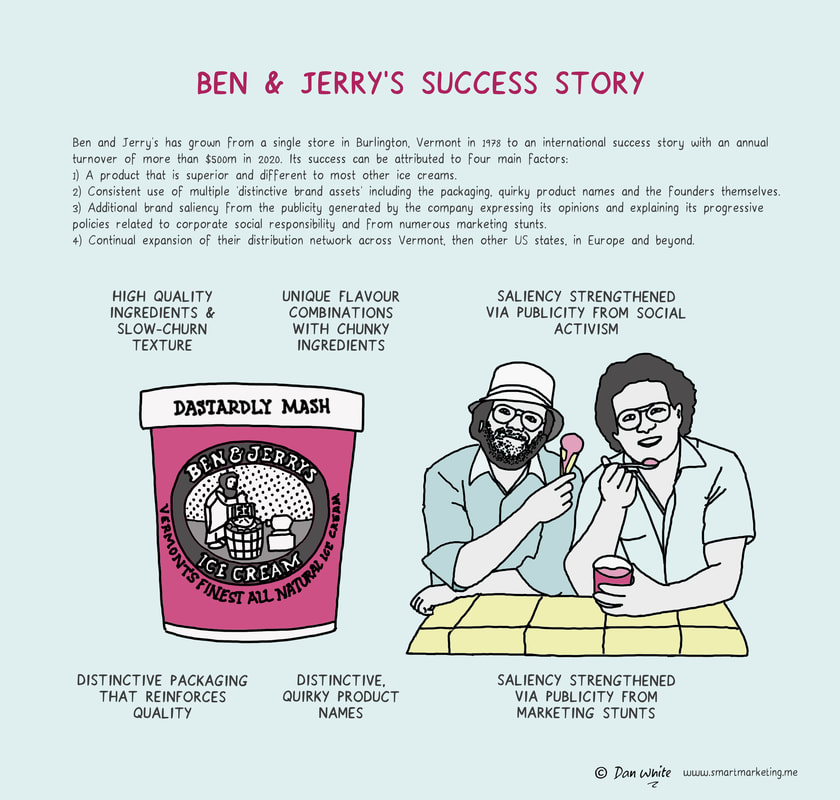|
In 1978, best friends Ben Cohen and Jerry Greenfield invested $11,000 to open an ice cream parlour in a converted gas station in Burlington, Vermont. Their ice creams were unique and sold at a super-premium price. They used top quality, all-natural ingredients, a slow-churning technique that delivered a silky smooth texture, and chunky extra ingredients.
In 1980, they started selling cartons to local grocers and from 1981 began opening franchise stores. By 1988, there were Ben & Jerry’s stores in 18 US states and the company achieved annual sales of $32m. They launched in the UK in 1994 (with a range including a special 'Cool Britannia’ flavour) and in other European countries soon after. By 1997, sales had reached $174m. The company was bought by Unilever in 2000 which helped it expand further. By 2020, the brand was available in 35 countries with annual sales of over $500m. The brand built a strong identity and high salience through its original flavour combinations, unusual product names and distinctive packaging. The brand’s fame was also boosted by the publicity generated by the founders’ social activism and marketing stunts. In 1986, the pair drove across the US in their “Cowmobile” giving out free ice cream. Following the stock market crash in October 1987, Ben & Jerry gave out free samples of their specially-created 'Economic Crunch’ flavour on Wall Street. The company’s two charismatic founders became memorable and distinctive assets for the brand they invented. Their views about how businesses should behave and their own socially-responsible ways of working generated a lot of attention and gave the brand added notoriety. When the company was sold to Unilever, its shareholders were keen to preserve the company’s corporate culture and socially activist philosophy so they included a number of conditions to the sale: 1) The new company must maintain a board of 11 directors, 9 of whom are independent of Unilever. 2) The board can veto changes to ingredients, new products and all marketing materials. 3) The company will continue to donate 7.5% or more of its pre-tax profits to charitable causes. 4) Employees will always be paid at least a 'living wage’ 5) Legal charges connected with potential breaches of these conditions of sale will be covered by Unilever. Despite the need for a few legal challenges over the years, these conditions have been upheld. Opinions on why Ben & Jerry's have been successful can be found in this LinkedIn thread and this follow-up. Here are some useful references: The Rise, Fall and Comeback of Ice Cream Giant Ben & Jerry's How Ben & Jerry's Took its Ice Cream and Mission Global Ben & Jerry's is Turning 40 What to learn more? Try asking Virtual Dan White. |
- Home
- Books
-
Illustrations
- Marketing
- Brand Development
- Brand Experience
- Innovation
- Communications Strategy
- Media Characteristics
- Creative Content
- Pricing & Sales Promotion
- Measurement
- Data and Analysis
- Brand Review & Planning
- Brand Extension
- Mental Processes
- Business
- Business Story Telling
- Case Examples
- Wellbeing
- People Skills
- Life Hacks
- Articles
- Media
- Services
- Merchandise
- Contact

